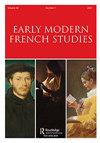女性的Querelle与Nicolas Boileau的讽刺作品X:超越Perrault
IF 0.2
3区 历史学
Q2 HISTORY
引用次数: 1
摘要
从琼·德让(Joan DeJean)到玛丽娜·华纳(Marina Warner)和杰克·齐普斯(Jack Zipes?研究波洛讽刺作品《X》争论的学者们倾向于将自己局限于佩罗的回应,完全忽略了尼古拉斯·普拉顿、皮埃尔·贝洛克、让-弗朗索瓦·雷纳德、克劳德·伊格纳斯·布鲁吉耶·德·巴兰特、玛丽·让·勒里蒂尔和让·多诺·德·维塞等作家和剧作家更明显的亲女性反应。因此,这项研究提出了第二个问题:我们对一个时期的认识论局限性的看法是基于一系列可用的实际话语,还是基于我们假设的该时期可用的话语,而这些话语往往局限于已经成为经典的话语?本文章由计算机程序翻译,如有差异,请以英文原文为准。
The Querelle des femmes and Nicolas Boileau's Satire X: Going Beyond Perrault
Critics from Joan DeJean to Marina Warner and Jack Zipes have lauded Charles Perrault's Apologie des femmes for its supposed defense of women against Nicolas Boileau's misogynous Satire X. Although Zipes wonders ‘[w]hether these works can be considered pro-women today,' this essay asks: can these works indeed be considered pro-women in the period in which they were written? Scholars studying the quarrel over Boileau’s Satire X tend to limit themselves to the response of Perrault, completely ignoring the more clearly pro-women reactions of writers and playwrights like Nicolas Pradon, Pierre Bellocq, Jean-François Regnard, Claude-Ignace Brugière de Barante, Marie-Jeanne Lhéritier, and Jean Donneau de Visé. This study thus asks a second question: are we basing our ideas about the epistemological limits of a period on the full array of actual discourses available, or on what we have assumed to be the available discourses of the period, which far too often is limited to what has become the classical canon?
求助全文
通过发布文献求助,成功后即可免费获取论文全文。
去求助
来源期刊

Early Modern French Studies
Multiple-
CiteScore
0.10
自引率
0.00%
发文量
14
期刊介绍:
Early Modern French Studies (formerly Seventeenth-Century French Studies) publishes high-quality, peer-reviewed, original articles in English and French on a broad range of literary, cultural, methodological, and theoretical topics relating to the study of early modern France. The journal has expanded its historical scope and now covers work on the sixteenth, seventeenth, and eighteenth centuries. Within this period of French literary and cultural history, the journal particularly welcomes work that relates to the term ''early modern'', as well as work that interrogates it. It continues to publish special issues devoted to particular topics (such as the highly successful 2014 special issue on the cultural history of fans) as well as individual submissions.
 求助内容:
求助内容: 应助结果提醒方式:
应助结果提醒方式:


